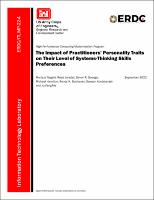Please use this identifier to cite or link to this item:
https://hdl.handle.net/11681/45791Full metadata record
| DC Field | Value | Language |
|---|---|---|
| dc.contributor.author | Goerger, Simon R. | en_US |
| dc.contributor.author | Ma, Junfeng | en_US |
| dc.contributor.author | Nagahi, Morteza | en_US |
| dc.contributor.author | Hamilton, Michael Andre, 1981- | en_US |
| dc.contributor.author | Jaradat, Raed M. | en_US |
| dc.contributor.author | Abutabenjeh, Sawsan | en_US |
| dc.creator | Information Technology Laboratory (U.S.) | en_US |
| dc.creator | Mississippi State University | en_US |
| dc.date.accessioned | 2022-10-26T17:08:52Z | en_US |
| dc.date.available | 2022-10-26T17:08:52Z | en_US |
| dc.date.issued | 2022-09 | en_US |
| dc.identifier.govdoc | ERDC/ITL MP-22-4 | en_US |
| dc.identifier.uri | https://hdl.handle.net/11681/45791 | en_US |
| dc.identifier.uri | http://dx.doi.org/10.21079/11681/45791 | en_US |
| dc.description | Miscellaneous Paper | en_US |
| dc.description.abstract | In this study, we used a structural equation modeling method to investigate the relationship between systems engineers and engineering managers’ Systems-Thinking (ST) skills preferences and their Personality Traits (PTs) in the domain of complex system problems. As organizations operate in more and more turbulent and complex environments, it has become increasingly important to assess the ST skills preferences and PTs of engineers. The current literature lacks studies related to the impact of systems engineers and engineering managers’ PTs on their ST skills preferences, and this study aims to address this gap. A total of 99 engineering managers and 104 systems engineers provided the data to test four hypotheses posed in this study. The results show that the PTs of systems engineers and engineering managers have a positive impact on their level of ST skills preferences and that the education level, the current occupation type, and the managerial experience of the systems engineers and engineering managers moderate the main relationship in the study. | en_US |
| dc.description.sponsorship | High Performance Computing Modernization Program (U.S.) | en_US |
| dc.format.extent | 45 pages / 1.01 MB | en_US |
| dc.format.medium | PDF/A | en_US |
| dc.language.iso | en_US | en_US |
| dc.publisher | Engineer Research and Development Center (U.S.) | en_US |
| dc.relation.ispartofseries | Miscellaneous Paper (Engineer Research and Development Center (U.S.)) ; no. ERDC/ITL MP-22-4 | en_US |
| dc.relation.isversionof | Nagahi, Morteza, Raed Jaradat, Simon R. Goerger, Michael Hamilton, Randy K. Buchanan, Sawsan Abutabenjeh, and Junfeng Ma. "The impact of practitioners’ personality traits on their level of systems-thinking skills preferences." Engineering Management Journal 33, no. 3 (2021): 156-173. https://doi.org/10.1080/10429247.2020.1780817 | en_US |
| dc.rights | Approved for Public Release; Distribution is Unlimited | en_US |
| dc.source | This Digital Resource was created in Microsoft Word and Adobe Acrobat | en_US |
| dc.subject | Systems-Thinking Skills Preferences | en_US |
| dc.subject | Myers-Briggs Type Indicator (MBTI) | en_US |
| dc.subject | Complex Systems | en_US |
| dc.subject | Moderation Model | en_US |
| dc.subject | Structural Equation Modeling | en_US |
| dc.title | The impact of practitioners’ personality traits on their level of systems-thinking skills preferences | en_US |
| dc.type | Report | en_US |
| Appears in Collections: | Miscellaneous Paper | |
Files in This Item:
| File | Description | Size | Format | |
|---|---|---|---|---|
| ERDC-ITL MP-22-4.pdf | ERDC/ITL MP-22-4 | 1.01 MB | Adobe PDF |  View/Open |